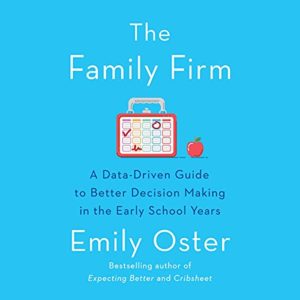Deliberate Parenting: Going Full Emily
By Amy Willis
What does it mean to treat the family like a firm, and how might this strategy work? That’s the idea behind Emily Oster‘s latest book, The Family Firm, and the topic of this episode. Host Russ Roberts welcomes Oster back for her fifth EconTalk appearance. She’s had a lot to share over these espisodes about being pregnant, about the challenges of parenting infants, and in her latest title, raising school-age children. (When she’s not investigating the effects of the pandemic on children…)

Oster is known for being a data-driven parent, but what she stresses in this episode is more deliberateness than data. (In fact, the conversation includes plenty of references to areas where the data we have at our disposal as parents is not very reliable…) Let’s hear what you have to say. Use the prompts below to share your reaction with us, or to start a conversation offline. If you really want to go “Full Emily,” you might start with your parenting partner…
1- What does Oster mean when she argues we don’t recognize the interconnectedness of our decisions? To what extent do you think Oster is right in suggesting we might attend to our parenting decisions in the same way we make choices in our jobs?
2- How can Oster’s approach help you deal with your partner when making parenting decisions, and why does she suggest her method is most useful when you and your partner don’t agree?
3- Oster admits that most research on the common questions we want answers to is of limited value, and Russ of course reminds us that what we really care about often can’t be measured. What are some of the areas Oster suggests the data is unreliable? Which among these parenting “truths” most surprised you, and why?
4- Roberts concludes by asking Oster how writing this book has changed her views as a parent. What, if anything, will you do differently as a parent after this episode? What is your family’s “mission statement?” (P.S. I’m trying to write down the three three things I most want to do each week…)
